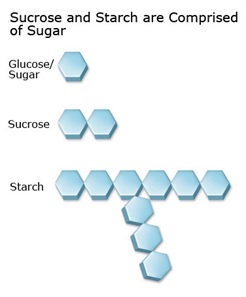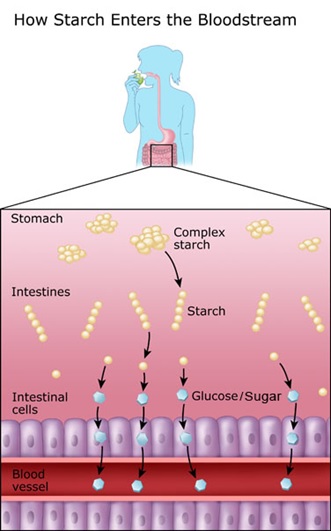Understanding Carbohydrates
If you have type 1 diabetes, you must match your carbohydrate intake to your insulin dose. To get the best blood sugar result, your carbohydrate count must be accurate.
When you have type 2 diabetes, your blood sugar will go up if you eat too much carbohydrate. If you are treated with oral medications that release insulin from the pancreas or insulin, you must match your carbohydrate intake to your medication dose. To get the best blood sugar result, you need to know how much carbohydrate is in your food and regulate your carbohydrate intake.
The best way to regulate your carbohydrate intake is to "count the carbohydrates" in your food. Carbohydrates are counted in grams – and even a few grams more or less can make a difference in your blood sugar reading.

Sugar
Sucrose and starch are comprised of sugars
Chemistry, Digestion and Sources of Carbohydrates
Chemistry of Carbohydrate
Carbohydrate is sugar – and includes both single sugar units called sugar (or glucose) and chains of sugar units chemically linked together called starch. Carbohydrate has to be broken down into single sugar units to be absorbed. Glucose is the most common sugar unit in our food and in our bodies.
Digestion of Carbohydrates Carbohydrate has to be broken down into single sugar units to be absorbed.
Sources of Carbohydrate
Carbohydrates are found in:
• Rice, grains, cereals, and pasta (macaroni, spaghetti)
• Breads, bakes, ground provision (yam, dasheen, cassava etc.), crackers (Crix)
• Dried beans, split peas and lentils
• Vegetables, like potatoes, corn, peas
• Fruit
• Milk
• Yogurt
• Sugars, like table sugar and honey
• Foods and drinks made with sugar, like regular soft drinks and desserts
Fibre
What about fibre? Fibre is a complex carbohydrate found in fruit, vegetables and whole grains. However, while you can eat fibre, you do not digest it. It will not cause your blood sugar levels to rise, so you do not need to take insulin to cover the fiber.
Self-assessment Quiz
Carbohydrates are found in which foods?
• Starch, fruit, milk, starchy vegetables
• Cheese, steak, chicken
• Olive oil, butter and fish
Starch, fruit, milk, and starchy vegetables contain carbohydrate. Cheese, steak, chicken, and fish are types of protein, while olive oil and butter are types of fat.
Which of the following are true statements?
• Sugar is a carbohydrate
• Starch is made up of individual sugar units
• Starch and sugar are carbohydrates
• Starch is first digested into individual sugar units before it is absorbed into the bloodstream
• All of the above
Which of the following are true statements?
• Sugar is a carbohydrate
• Starch is made up of individual sugar units
• Starch and sugar are carbohydrates
• Starch is first digested into individindividual sugar units before it is absorbed into the bloodstream
• All of the above
All of the answers are correct. However the best answer is "All of the above". Both sugar and starch are carbohydrates. Starch is broken down into individual sugar units in the intestines. The individual sugar units are small enough to be transported across the intestinal wall into the blood stream.
Which food will raise your blood glucose the most quickly?
• A bagel
• Diet soda
• Fruit juice
Fruit juice will rapidly raise your blood sugar because it has a lot of sugar and is a liquid, and liquids are more rapidly absorbed than solids. A bagel will raise the blood sugar - but only slowly, because it takes a while for the starch to be digested into sugar and absorbed. A diet soda has no carbohydrate and will not raise your blood sugar.
How starch enters the bloodstream

 BCDF
BCDF